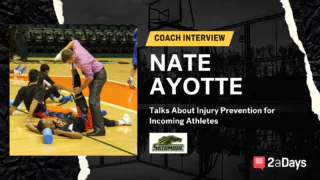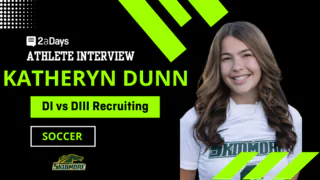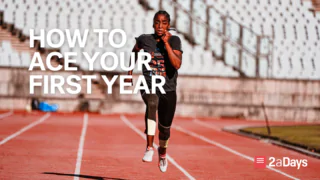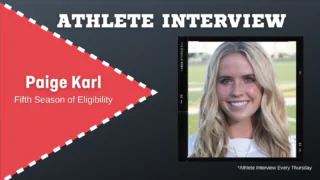An athlete's first college preseason can be intimidating, but add on an injury and not being able to play for weeks, and it becomes a nightmare. Nate Ayotte is one of the three athletic trainers at NCAA DIII Skidmore College. He covers six different sports and sees many different athletes come in and out of his office every day. Nate walked us through the best ways to prepare for the college level and how to avoid injuries coming into your first college preseason!
What are the varsity teams that you work with?
At Skidmore College, I have primary coverage responsibilities with collegiate Division III Women's Soccer, Women's Tennis, Men's Basketball, Men's and Women's Swim and Dive, and Men's Lacrosse. However, being at a smaller institution, it's not uncommon for myself and the other 2 full-time Athletic Trainers to share coverage amongst all of our 19 Varsity sports.
Related: When to See Your Athletic Trainer
What are some of the most common injuries you see with freshmen in their first college preseason?
Most incoming athletes are anxious, nervous, and/or excited about coming into the first college preseason and have put in a lot of training over the off-season/summer. This usually comes in the form of running, biking, or general cardiovascular training – which is great. However, most injuries I see come from very functional movements and exercises specific to their sport. With women's soccer, for example, reactionary injuries are prevalent for those adjusting to the speed of play and level of competition they now find themselves in. Ankle sprains and hip complex strains are often indicative of an athlete struggling to meet the sport-specific demands when their summer training consisted of more general conditioning. Of course, this isn't always the case, but I love to see athletes coming into a pre-season who have trained specifically for the movements, actions, and demands of their sport. Sport-specificity is key!
What are some ways that freshmen could prepare physically to ensure they come into their first college preseason without injuries?
As I said above, sport-specific training is key. Finding a summer league or competitive venue even once or twice a week during the summer before your freshman year can make a huge difference. Finding older collegiate athletes to play against can also make the transition less drastic when you arrive on campus in the fall. This should be in addition to cardiovascular and strength training – all three components play a vital role.
In a percentage, how many of the injuries you see are preventable, compared to the unpreventable freak accidents?
The vast majority of athletic injuries are due to some form of muscular imbalance – a condition which is prevented by proper strength and conditioning practices. Putting an emphasis on strength and conditioning will no doubt decrease the risks associated with sport-specific injuries. Yes, “freak accidents” happen, but I would say less than 5% of all injuries are not linked to preventive training, in some form.
Related: Villanova Athletic Trainer, Jeremy Madrid's 8 Preseason Training Tips For College Athletes
What are some exercises that you think all athletes should be incorporating into their exercise to reduce injury risk?
I would suggest keeping things sport-specific while getting out of your comfort zone. More than any specific exercise, how you train makes a world of difference and can prepare you for the uncertainties that lie ahead of your first year. Most incoming athletes have been one of, if not the best players on their respective high school or club teams – it's easy to feel accomplished and complacent. I would encourage athletes to push outside of their routine training, all while adding more sport-specific exercises That could come in the form of more dynamic weight training and plyometrics, or through higher-level competitive play with athletes who may be older, stronger, or more skilled. Learning how your body responds to being pushed will give you more confidence both mentally and physically once you arrive at school!
If you could give one piece of advice to incoming freshmen preparing for their first collegiate season, what would it be?
Prepare and enjoy! Preparation will ease even the most anxious of first-year student-athletes, and with preparation comes the ability to enjoy the experience of being a part of a collegiate program. Your teammates, the relationships, the comradery, the competition – all of it is so much more enjoyable if you have put yourself in a position to succeed. That all starts, in my opinion, with your training methods during the summer, so I hope this all helps!
Have a story idea or know an awesome athlete/coach we should interview? Email us at [email protected]
* Originally published on June 19, 2023, by Bella Nevin







